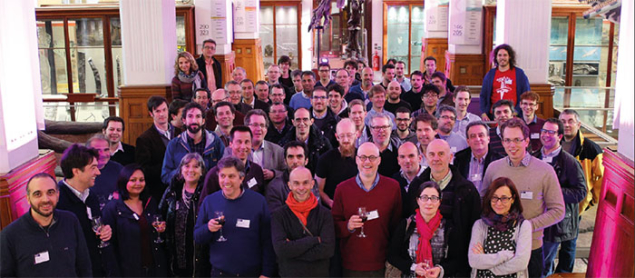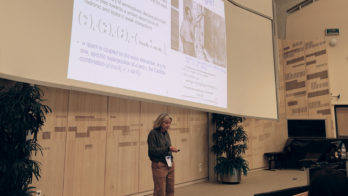Eighty physicists gathered in Manchester on 6 and 7 April to discuss the future of the LHCb experiment. The LHCb collaboration is currently constructing a significant upgrade to its detector, which will be installed in 2019/2020. The Manchester workshop, entitled Theatre of Dreams: Beyond the LHCb Phase-I Upgrade, explored the longer-term future of the experiment in the second-half of the coming decade, and thereafter.

Image credit: Sam Tygier.
In the mid-2020s, the LHC and the ATLAS and CMS experiments will be upgraded for high-luminosity LHC operation. These activities will necessitate a long shutdown of at least 2.5 years. The Manchester meeting discussed enhancements to the LHCb experiment, dubbed a “Phase-Ib upgrade”, which could be installed at this time. Although relatively modest, these improvements could bring significant physics benefits to the experiment. Possibilities discussed included an addition to the particle-identification system using an innovative Cherenkov light-based time-of-flight system; placing detector chambers along the sides of the LHCb dipole to extend the physics reach by reconstructing lower-momentum particles; and replacing the inner region of the electromagnetic calorimeter with new technology, therefore extending the experiment’s measurement programme with photons, neutral pions and electrons.
Around 2030, the upgraded LHCb experiment that is currently under construction will reach the end of its foreseen physics programme. At this time, a Phase-II upgrade of the experiment may therefore be envisaged. During the meeting, the experimental-physics programme, the heavy-flavour-physics theory perspectives, and the anticipated reach of Belle II and the other LHC experiments were considered. The goal would be to collect an integrated luminosity of at least 300 fb–1, with an instantaneous luminosity a factor 10 above the first upgrade. Promising high-luminosity scenarios for LHCb from the LHC machine perspective were shown that would potentially allow this goal to be reached, and first thoughts were presented on how the experiment might be modified to operate in this new environment.
Many interesting ideas were exchanged at the workshop and these will be followed up in the forthcoming months to identify the requirements and R&D programmes needed to bring these concepts to reality.
The meeting was sponsored by the Science and Technology Facilities Council, the Institute of Physics, the Institute for Particle Physics Phenomenology and the University of Manchester.





